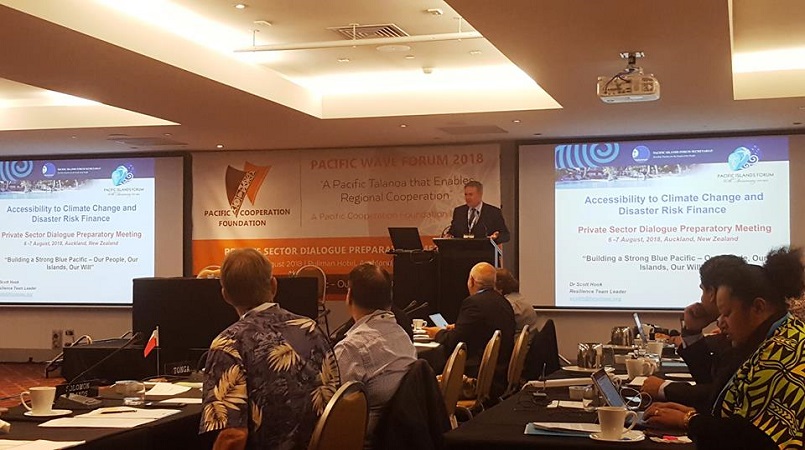
The annual Pacific Island Forum Secretariat-led Private Sector Dialogue Preparatory Meeting was held last week in Auckland.
The meeting discussed actions the private sector needs to take in the Pacific region to challenge climate change, Non-Communicable Diseases (NCD) and other relevant issues.
The preparatory meeting is held annually ahead of the annual Pacific Islands Forum Leaders meeting, where Pacific Island leaders consider the recommendations from the preparatory meeting. This year, the Pacific Island Forum Leaders meeting will be held in Nauru on September 4.
The meeting was hosted by the Pacific Cooperation Foundation (PCF), the Pacific Islands Forum Secretariat (PIFS) and the Pacific Islands Private Sector Organisation (PIPSO). It brought together National Private Sector organisations (NPSO) representatives from member countries of PIFS.
At the end of the meeting, a sub-committee drawn from the delegates, drafted a document of recommendations for consideration by the 16 leaders of the Pacific Island Forum nations in Nauru next month.
Among topics discussed and deliberated were the effect of NCDs, climate change and regional security on the private sector and how the private sector could help combat these growing threats to the Pacific Island region and its peoples and mitigate their undesirable effects.
Dr Viliami Puloka, of the Health Promotion Forum in New Zealand was the Keynote Speaker and Moderator for the session on NCDs. In his perceptive presentation Dr Puloka ), the table revealed that the Pacific Islands region has six of the ten countries around the world most affected by diabetes with Tokelau coming on top of the list with 30 per cent Tokelauans in the age group 20-79 affected.
Nauru, the Cook Islands, the Republic of the Marshall Islands, Palau and New Caledonia form the top countries of ten after Tokelau. “The percent of people affected by NCDs will rise substantially in the Pacific in the coming decades,” the International Diabetic Federation has warned.
Dr Puloka advocated education as key driver to raise awareness about NCDs and reverse its runaway growth in the region. This is where the private sector can play a role, Dr Puloka said.
The Pacific Island Forum Secretariat’s Dr Scott Hook presented on the accessibility of climate change disaster risk financing with a view to involving the private sector in accessing the funds and contribute to climate adaptation programmes driven by the private sector.
Oceania Customs Organisation Secretariat’s Operations Manager Tevita Tupou highlighted the generally understated issue of the real threats to security around the region. Mr Tupou, who has a region wide focus on customs, revenue, border control and regulation, has a ring side view of the security threat that affect the region – something of which there is little awareness in the public and even the Pacific Island media.
He stressed on the fact that nearly every major underworld organisation working in the developed nations, especially Australia, New Zealand, the United States and China were well represented in almost all of the island nations, with operational offices either through franchises or fronts that appeared to be legitimate businesses. These operations took advantage of the poorly resourced infrastructure and inadequate policing measures in Pacific Island countries, he said.
He was speaking in the context of the PACER Plus trade agreement that needed to take on board the important factor of regional security and how it not only affected trade and business but also national security of sovereign nations.
The meeting also deliberated on the way forward for PIPSO, the apex organisation of the national private sector organisations around the Pacific Islands region.
The recommendations drafted by the sub-committee will be presented to the 16 leaders of the Pacific Island Forum member states at their next annual meeting in Yaren, Nauru, in early September.
Photo by PIF
